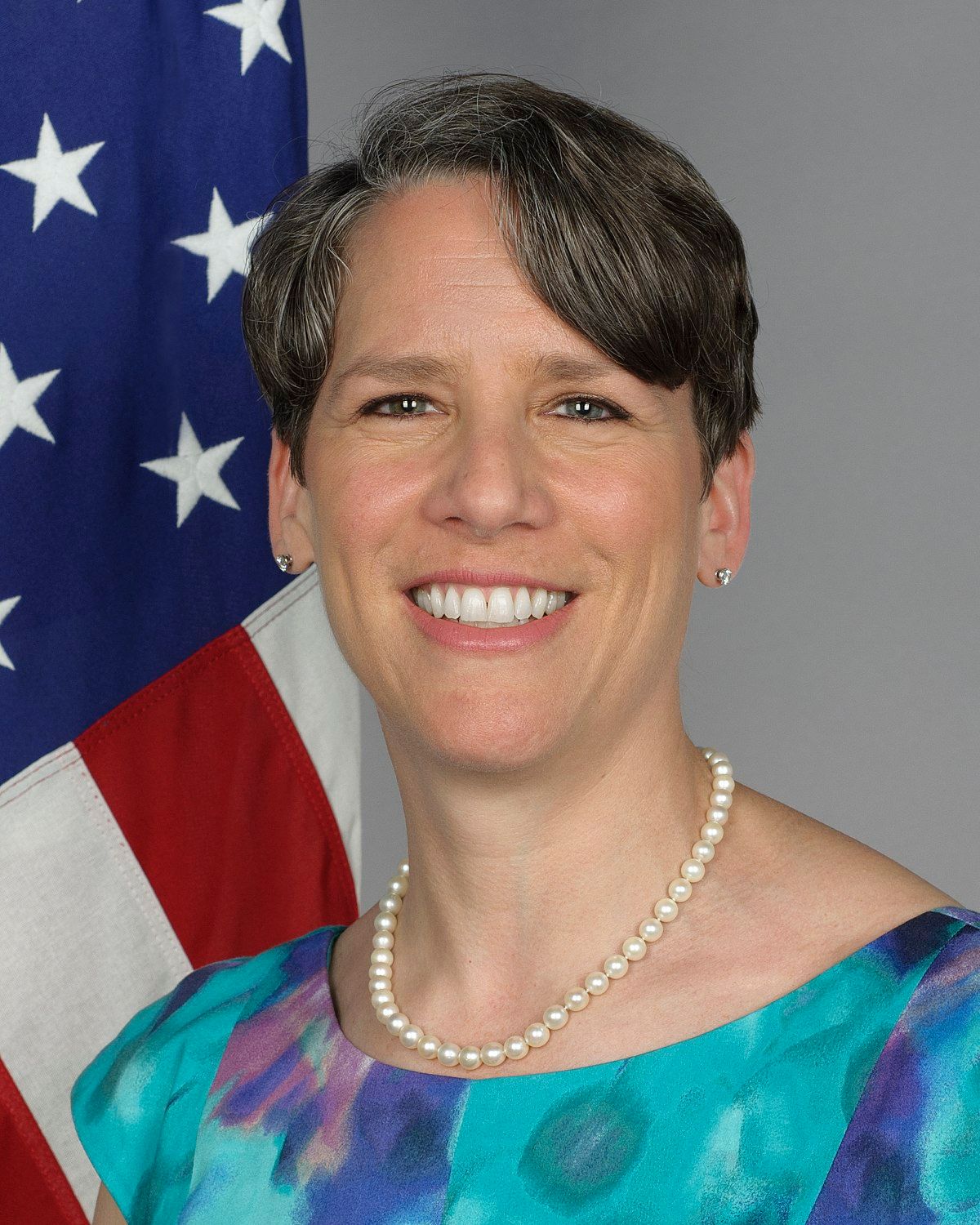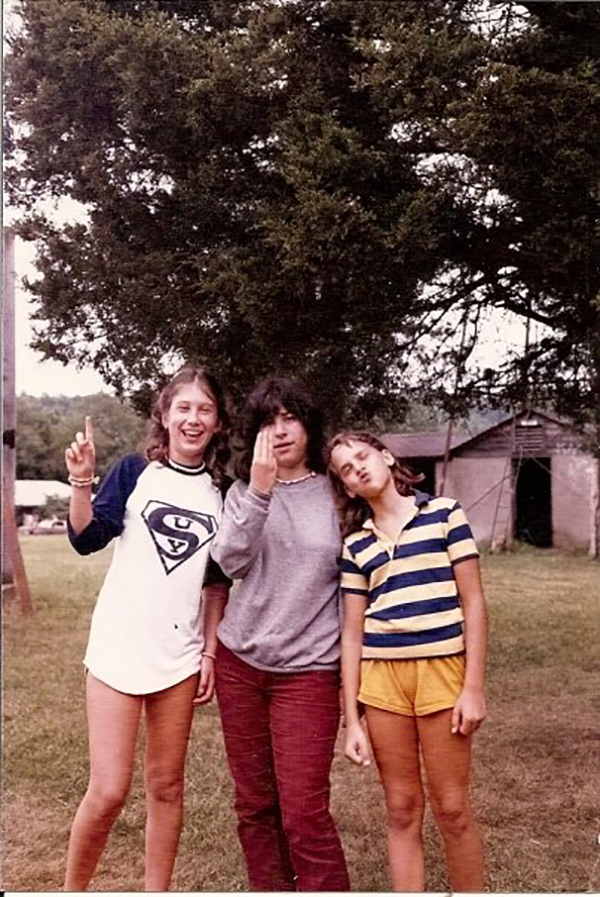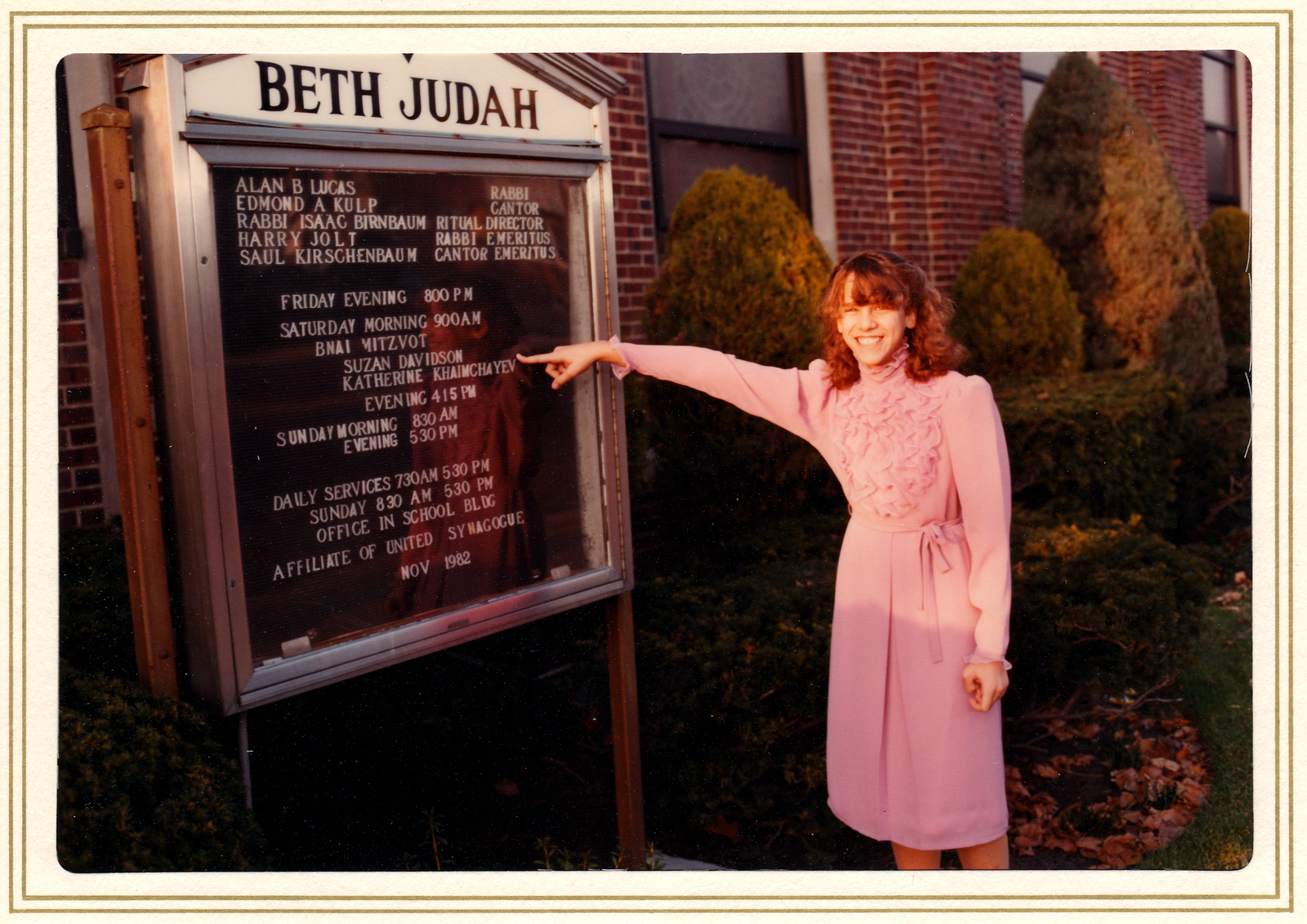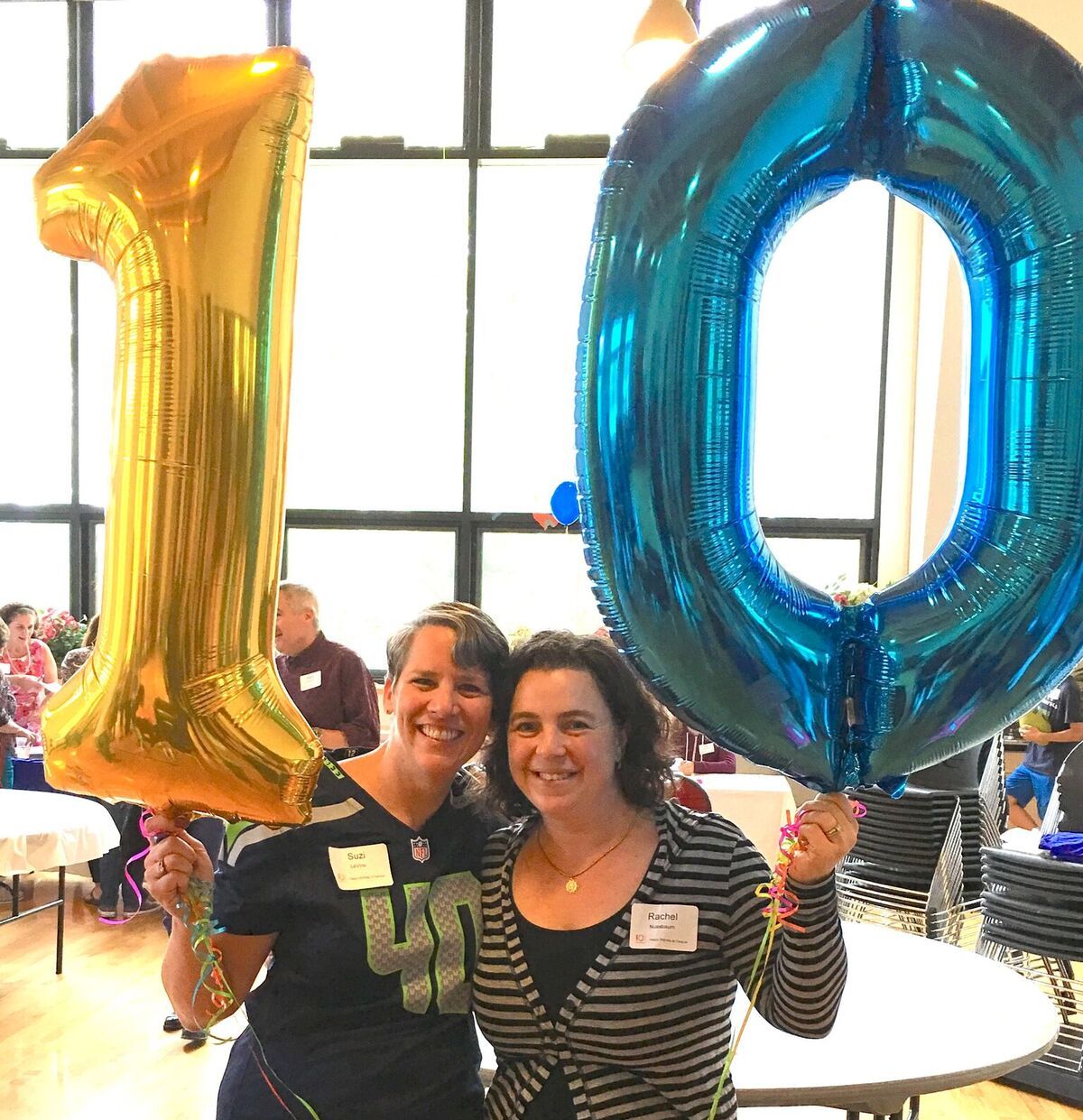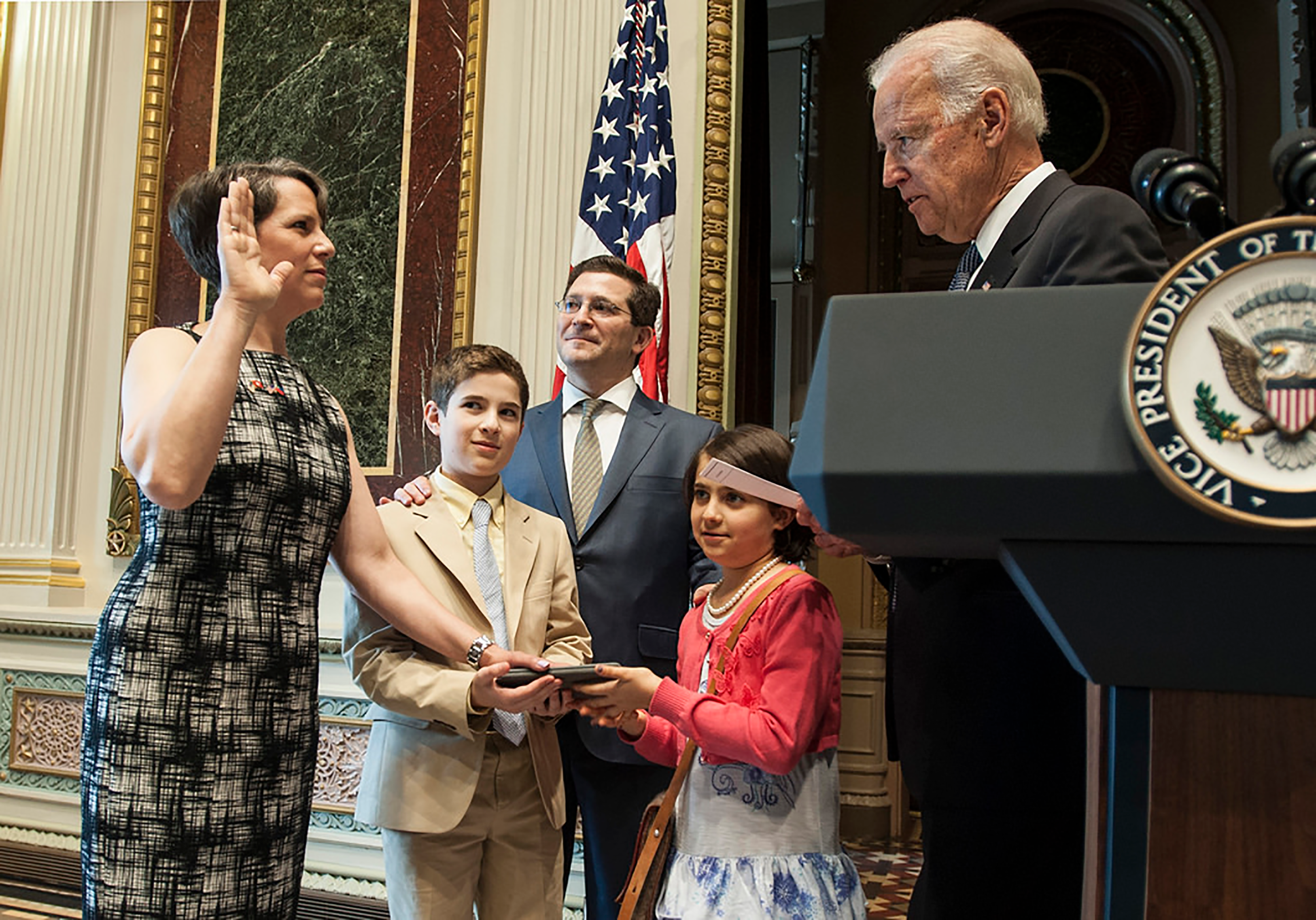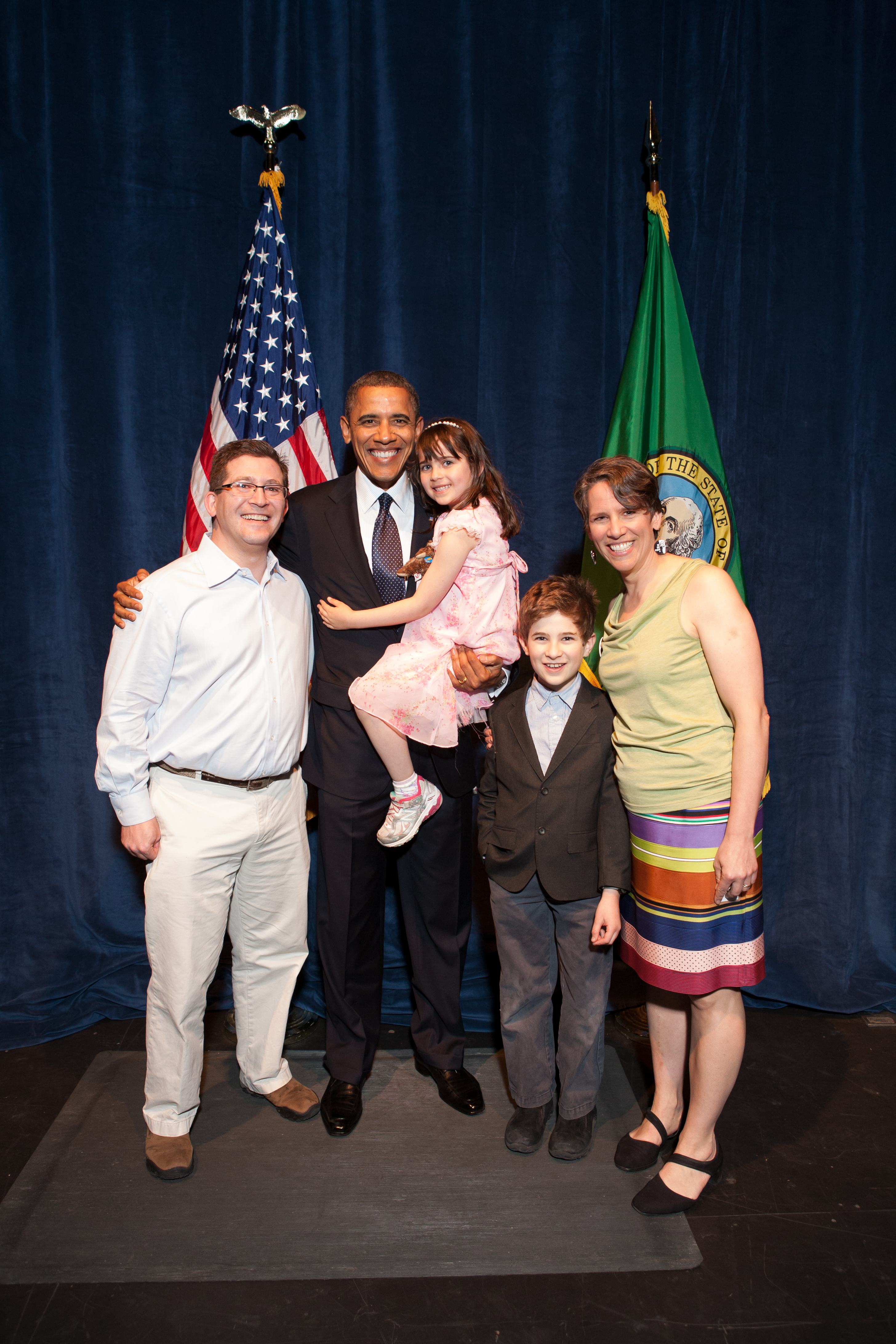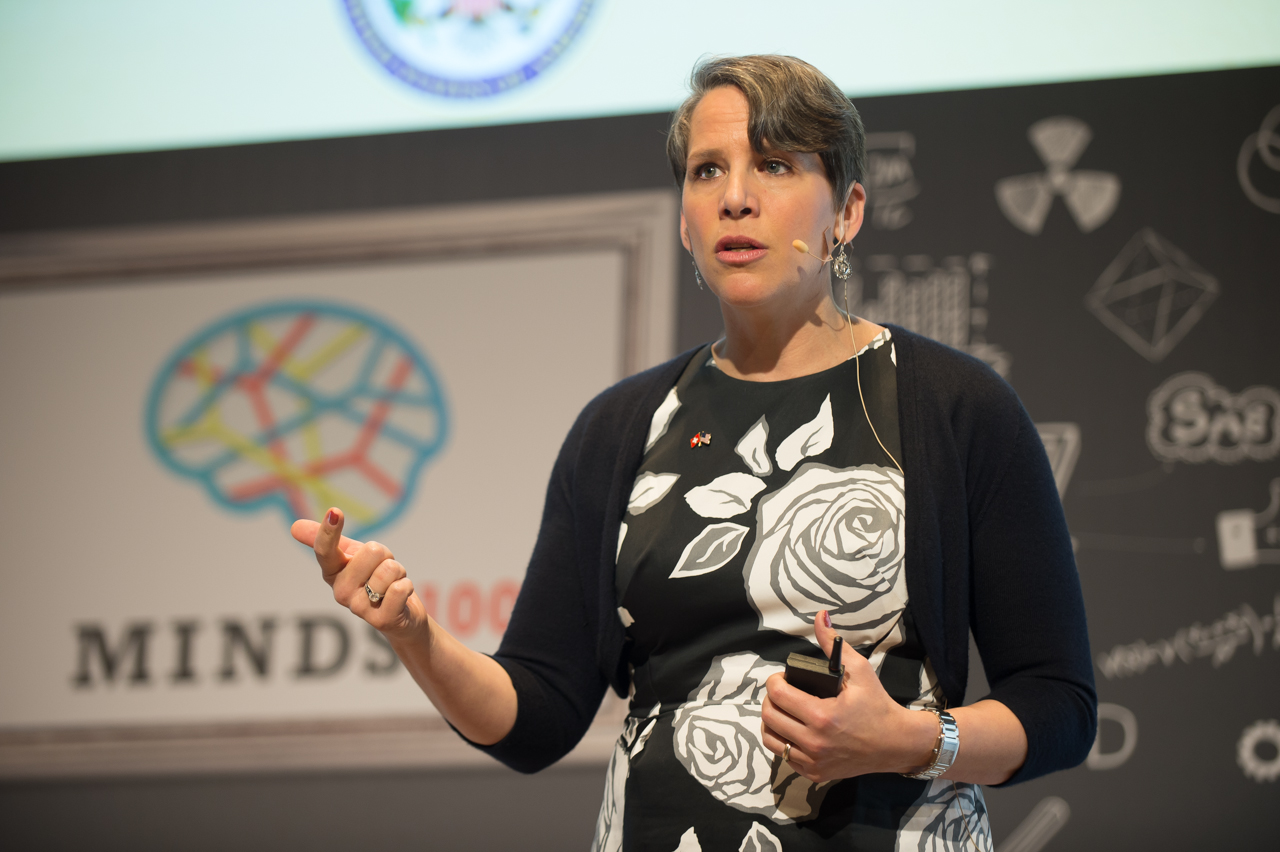Pursuing Jewish community in Seattle
When you come to this city during a boom at Microsoft, straight out of college, the world’s your oyster. Well, I guess that’s not very kosher, but the world’s your babka. I got involved right away at Grads Plus at the University of Washington Hillel, so I had an instant community there. I had community at Microsoft, I didn’t feel like I was missing anything. I had a very different experience that way, and then I made my Jewish community. When Rachel and I co-founded Kavana, that stemmed from, “Gosh, I’m feeling a little old for Hillel, I’m about to have a second baby, and I really don’t want to nurse another kid through High Holiday Services.” It felt a little awkward! I was gonna go around and interview rabbis, and I started with Rachel. It was basically Hillel for grownups that I was seeking. She said, ‘I’m sorry, that doesn’t exist. But if you find it, let me know, because I want that too.’ Then I spoke to Rabbi Dan Bridge, I said, ‘Dan, when are you gonna start a synagogue?’ And he said, ‘I’m not, but maybe you will.’ And I didn’t start a synagogue, right? What we started was a cooperative. It was about how do we provide a very multidimensional environment in which people could figure out what is a meaningful Jewish life for them. So, I co-created the community that I wanted. And I never felt that I was lacking.
I was raised in a family that was conservative. We kept kosher growing up, we did Shabbat dinners, I went to Hebrew School three days a week--Mondays, Wednesdays, and Saturdays--and our family life was very Jewish. I went to Israel a couple of times over the course of my growing up, and when I was eighteen I went to Israel for I think it was three and a half months. I lived up in Tsfat and did a program called Livnot U’lehibanot. When I was younger, I went to a Jewish summer camp with an organization called Habonim Dror, which basically run the camps like kibbutzim. I had a lot of Judaism in my life growing up, and then after my time that I spent in Israel on the Tsfat program, I had a whole different sense of what community was about. When I started at Brown, I got very involved in the Hillel, and that started me as a community organizer. I got involved in the Jewish Student Union there, including becoming the president, and then when I came out here I got involved in Grads Plus at Hillel at the University of Washington. And then I met my husband, and started to think about what does it mean, what is a meaningful Jewish life?
The influence of Jewish values
I wake up every single day thinking, “How do I make the world a better place?” If you were to crack open my arteries and do an analysis of my blood, you would see Tikkun olam, flowing, it wouldn’t just be DNA strands. It would say, “Tikkun olam.” It’s who I am, it’s what I do. It’s what motivates me. I’ve had a very nonlinear course over my career, but my North Star has always been that. That is one of the overwhelming factors in my decision making. That comes from seeing my mom do that in the Jewish community, seeing leaders in our Jewish community and their decisions, and having studied. I’ll give you an example: I was very honored to have been able to do the Wexner Program here. I remember one of our first classes talked about business ethics. There’s a passage in the Torah that talks about, or you can interpret it as, paying your laborers on the day of their work. And it is so much of the core of the dignity of work. How do you show respect for people? How do you show respect for their time, for their work, for their intellect, for their contribution to society? Those are some of the ways that my Jewish values inform my life. The other thing is as somebody who keeps kosher, I have to be extremely mindful with what I consume, how I spend my time, right? It makes me that much more aware of others, and how I can help them with whatever their needs might be. And so that Kashrut has given me both this sense of individuality, as well as a sense of awareness of what’s going into our bodies at any given moment in time. We can’t take that for granted, and we also need to be aware of what we are serving and providing others.
My career was very nonlinear. I graduated with a degree in engineering and a degree in English, and I started at Microsoft in 1993. I was the last person hired onto MS-DOS at Microsoft, and that team became the core Windows 95 team. When people think about these unbelievable moments in the history of technology, the Windows 95 launch was one of them. I organized a world tour, ran the manufacturing from the product side and did the forecasting. I was also the person who got to demonstrate Internet Explorer for the first time publicly with Jay Leno during the launch of Windows 95. Being part of that exceptional team was a very seminal moment. When I moved to the Expedia team in 1998 it was a part of Microsoft. I did not know that we would be spinning out as a separate company. I was running our communications and public relations at that time and it was the moment when online travel became one of the primary ways that people put together, plan, and then book their travel. I left Expedia in 2005. I then stayed home with my kids and started a couple of nonprofit organizations including Kavana in the Jewish community, an advisory board at the University of Washington, I-LABS. And then went back to Microsoft. And then left Microsoft again. From 2007 and 2013, I was volunteering on the Obama campaign and then for the White House. All of that to say, my entire career prepared me for my job as ambassador.
Having studied engineering, I was accustomed to an environment where there were very few women. So, it didn’t feel awkward or strange for me. It was an amazing and wonderful and dynamic set of people. That said, over the course of my career there have been moments in time where my voice was important because I brought a diverse view that the others in the room, because they were men, hadn’t considered. Or there were moments in my career that I can look at and say, ‘You know, I wasn’t treated the way I should have been treated, because I’m female.’ Those did happen over the course of my career, and in my college time. I look at those moments and I think, ‘Well how do I grow from that? What can I do to make a difference? What can I do so that others don’t have that experience going forwards? Or how do I help those guys understand the implications of that?’ Because those weren’t malicious moments. They were unconscious bias in many of these cases.
The #MeToo movement is about respect. This is raising people’s voices and giving a space for their voices. It is encouraging people to question their actions and their words that they might have thought were hilarious, or that they might have thought were benign or not a big deal. It is helping them finally be aware that they had much more impact than they realized. Think about all the young women engineers who would say, “You know what, to heck with it. I’m done! I don’t wanna work with these guys.” If we can make better environments and prevent that from happening, awesome. It’s also important to empower individuals to know that saying no is okay, and others need to know that “no,” is not enough. You also need to hear “yes.”
When Rachel Nussbaum and I co-founded Kavana, that was a very special time in the Jewish community. Small, innovative Jewish startups were starting to get some traction, but not so much up here in the Northwest and in other places across the country. So again, we were at this very seminal moment in time, looking at models like Rick Warren’s church down in Southern California, the Queen Anne Cooperative Preschool; Social venture partners asking ourselves “What are the innovative models, not just from the Jewish community, that we can draw from for building this innovative community?” Now Kavana is part of the emergent network, which brings together many different communities across the country to learn from and innovate together. And it’s an evolutionary community. It will change over time. What exists today in Kavana did not exist ten years ago in Kavana. It is designed to be a highest common denominator community. If you come in and you don’t know anything about Judaism, it isn’t an environment in which we slow down our speech and speak more simply. If anything, it is, “Alright, let’s find the really challenging place that engages and excites you, and taps into your own knowledge system,” and brings you in that way. Those are some of the elements of which I’m very proud of what we’ve created, and they have enabled it to be a nimble community that has been seen across the country as a source of innovation and inspiration. I feel so blessed to have been a part of it.
Perspectives on government work
Going into my ambassadorship, I was just so excited to serve the Obama administration and do what I could for my community, my nation, and for the world. You’re like the CEO of a little company and the company is called ‘the United States of America in That Country.’ For me it was an easy transition from Microsoft… It was like I was the country manager, and I was able to define the priorities, to build the relationships, to listen and figure out what is our marketing plan. And I had an amazing team. I think the thing that delighted me the most that I didn’t expect, was the unbelievable quality of individuals who had chosen this as their careers, and the diverse sources of those individuals. And then really getting a sense of our foreign service as our frontline. There’s a line that people often say, that ‘war is failed diplomacy.’ Our diplomats are the ones who are making sure that relationships don’t degrade. They’re protecting our security and our economic well-being. We, in the United States, don’t often see that because they, often by statute, are not allowed to market the work that happens abroad. So, the people, the quality, and the dedication that those individuals have to the well-being of our nation continues to blow me away.
As a non-career ambassador, you are expected to turn in your resignation with a transition of power. I was incredibly proud to have served for President Obama in that capacity, and for the United States of America, and I turned in my resignation, as did all the non-career ambassadors, and then we were able to put things in place to be able to come home. I’d like to say that it was my choice, and at the same time I recognize that President Trump did not extend anybody into his term. I did not want to continue serving; as ambassador, you are the personal representative of the President of the United States. My boss was President Obama. I needed to be able to represent in good faith all those policies. Additionally, if I had issues or concerns, I also needed to know that I had channels through which to share those issues. Plus, Washington State is an amazing place to come home to, and we have a lot of work to do here, in terms of helping build jobs, and helping restore our democracy.
Bringing Swiss models into the U.S.
What we saw and experienced in Switzerland around the Swiss model of apprenticeship is something from which we can learn and apply here and adapt here that will give people access to that American Dream and to the dignity of work. My husband and I have been doing presentations and meetings all over the United States. We met with different governors or their staffs. We organized and brought Governor Inslee and a delegation of 45 business and academic leaders to Switzerland to see their system, and we believe that by expanding the paths that people have, we will be able to ameliorate one of the key issues that we have as a nation. That is one way that I am taking my experience and really bringing it back. We are partnering to make this difference here in Washington state.
In terms of restoring our democracy, the key focus there for us is addressing gerrymandering. The gerrymandering that was done in 2011 broke our democracy. We previously had over a hundred different districts across our nation that were swing districts, where those representatives had an incentive to listen to those who may not have voted for them. We are now at fewer than 25. And we’ve seen it in the results at the federal level, but we’re also seeing it in the results at the state level. My husband and I are working very hard so that we can address the gerrymandering, so that when the next redistricting happens in 2021, we can get back to fair districts. It’s not a matter of left or right, it’s a matter of fair. Because then our representatives, whether at the state or federal level, will need to listen to all Americans and not just a small subset of those Americans. We’re working closely with former Attorney General Eric Holder and his team, the National Democratic Redistricting Committee. We’re helping them think about the redistricting process, the census, what are some the issues that may come up, and how do we support them and enable them.
I recognize that the path to success has many beginnings, and they don’t all start with a university degree. Here in the United States you hear a lot of people, especially politicians, talking about making kids college-ready. I would argue we need to make our kids career ready. College is one among many paths. It’s going to take a big cultural shift to get people over the hump, because we really programmed people on this point, and we’ve programmed employers. Employers post jobs for requiring a university degree, that don’t require a university degree! It has become a replacement for, “We’re looking for these skills, or these capabilities.” In Switzerland what we saw was a system, not a program, where seventy percent of kids do apprenticeship, not high school. The school is tailored to the type of apprenticeship you’re in. All apprentices are studying citizenship and small business accounting, so every apprentice there finishes and knows how to run a business and how to vote. The key structural aspect of it that makes it is that they’ve built in permeability. You can go from your apprenticeship on to higher education, and 30 percent of Swiss apprentices do. There are almost 250 different career pathways from white to blue collar, and it’s prestigious to start as an apprentice. When you look across Swiss society, you have CEOs, federal counselors, university heads, and other leaders who started as apprentices. You have entrepreneurs who are creating startups who started as apprentices. It’s pervasive in the society, and it’s not a government program. So, what we’ve been doing is talking with different governors, working very closely with them. Here in Washington state we have this delegation with Governor Inslee, and there’s a lot of momentum on this front. Washington state has a lot of programs in apprenticeship. But they’re not a system, it’s not cohesive. There’s a lot to learn, and we believe that this is one of the core answers to the question of “How does our country continue to grow and prosper into this next century?”
My mentors are people that I think are great, and wise, and from whom I love to learn. We have just an incredible chemistry and bond. I didn’t try to have mentors and I don’t try to be a mentor. What I do have is people in my life that I learn from and look up to, whether it is my husband, whether it is my mother, whether it is Michele Rosen, whether it is Bob Watt, whether it is Will Poole. These are just some of the people from whom I learn and grow. Whether it’s my good friend Dana Shell Smith who was our ambassador to Qatar, or Michael Hoza who was our ambassador to Cameroon, there are people who are both peers and mentors, as well as people who have had many more experiences than I have. Mentorship can take on many forms; it doesn’t have to be a high-stress, high-stakes thing.
I’m a glass half-full kind of person. I’m a citizen, is what I am. I think about the people of the United States, the citizenry. We’re the ones with the power, and it’s a question of how do we put that forward, and how do we light people up, and get them to vote, get everybody to vote. So, how do I take what my experience was and bring it back here? My goal continues to be what my goal has always been, which is making the world a better place. How do we help everybody have the dignity of work, what can we learn from the Swiss model, and how do we share that? How can I use my knowledge and my experiences and make a difference ? And then, restoring our democracy. We’ve got a lot of work to do, but we have a lot of great momentum, and I feel confident that if we can turn out voters and get people to really start talking and listening with each other, then we will be able to get back to having a representative democracy by November 3rd, 2022, which will be the day after the first election on new district maps.
*On May 8, 2018, Governor Inslee named Suzi LeVine to his cabinet as commissioner for the Employment Security Department. She started work July 9, 2018.
